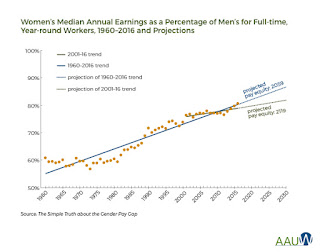Sullivan's response aims not so much at that incident — covered elsewhere more extensively — but at the problem that male nature poses to academic gender studies that is, well, nature, i.e. genetic and driven largely by testosterone. "All differences between the genders [in the gender feminist telling]," he continues, "... are a function not of nature but of sexism." Loufbourow leaps from her feminist studies coffin to declare this bit of sunlight "beyond vapid", and his "attempt to naturalize the status quo is so damaging", as though acknowledging biological realities are somehow a political act.
In fact, it is. Loufbourow's main argument is that
The real problem isn't that we — as a culture — don't sufficiently consider men's biological reality. The problem is rather that theirs is literally the only biological reality we ever bother to consider.That is, we needn't consider why men might have a very strong internal motivation to copulate with any available desirable woman; we should instead look at why women have such a hard time with sex. While it's important for men to have empathy with someone you propose to bed (!!!), it is also absurd for women to ignore nature. That "Grace" decided to join a man at his apartment on a first date, ignoring the implications for such a meeting from the male perspective, rates no mention. So when she complains that
... PubMed has almost five times as many clinical trials on male sexual pleasure as it has on female sexual pain. And why? Because we live in a culture that sees female pain as normal and male pleasure as a right.what she is missing is that male sexuality is exactly as Sullivan describes it: very goal-oriented. "[M]ale pleasure as a right" is the wrong way to describe it: male pleasure is a goal. Pursuit of that goal will sometimes result in very regrettable outcomes for women. Note I do not here endorse such behavior, but women sleeping with men they barely know play a dangerous game.
Loufbourow is on firmer ground when she describes the medical research disparities between men and women, though if she were honest, she would have to acknowledge that breast cancer research receives over twice as much funding as prostate cancer, both the number two killers of their respective sex. (This has equalized considerably since 1994, when prostate cancer received one-fourth the research dollars as breast cancer.) That is, the terrain slopes nowhere near as steeply as she claims. And if "culture" were to blame for indifference to female pain and suffering particularly, how is it that male occupational deaths represent 93% of the total (as of 2016)?
But at bottom of this stew of resentment lies the typical hand-wave of female agency: the lady could have said "no", or better still, could have declined the offer to visit the apartment of an acquaintance on a first date. Loufbourow explores these options not at all. Is this old-fashioned? Yes, of course. But it also bows to the powerful reality of male sexual impulses. Not every man is a cad, but relying on the good behavior of strange men is a losing proposition, and sometimes, fatally. Also, holding a man accountable for reading your mind is not only unreasonable, it's insane and childish. "Grace" nowhere makes clear what she intends to do on the night, giving and receiving oral sex, but withdrawing when Ansari presses for actual intercourse. Talk about mixed messages! As Flanagan put it, "Apparently there is a whole country full of young women who don’t know how to call a cab".
Loufbourow spends her final paragraphs sputtering about the "lessons society teaches", which is really a restatement of the blank slate theory of human nature. Blank slate-ism relies on teaching as its foundation, rejecting the prospect of innate nature. The notion of an innate, genetically-determined human nature is deadly to gender feminism, for the reason Jerry Coyne cited:
[Claims that no innate differences between racial groups or the sexes] are based not on biological data, but on ideological fears of the Left: if we admit of such differences, it could foster racism and sexism. Thus. any group differences we do observe, whether they reside in psychology, physiology, or morphology, are to be explained on first principle as resulting from culture rather than genes.That is, it threatens the ghost stories underpinning gender feminism. Meanwhile, the women who ignore the powerful realities of testosterone put themselves at risk for disappointment at a minimum, and real danger at worst.

